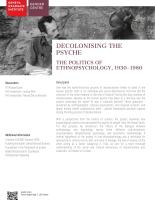Timeline: Fall 2021-Summer 2026
Funding institution: Swiss National Science Foundation in the framework of project leader Mischa Suter’s Eccellenza Professorial Fellowship
Background
How was the world-historical process of decolonisation linked to ideas of the human psyche, both in its individual and social dimensions? And how did the sciences of the mind respond to the end of empire? During the long moment of decolonisation, debates on the human psyche took place in a new key: was the psyche universally the same? Or was it culturally distinct? These questions – pondered by anthropologists, colonial psychiatrists, anti-imperial activists, and global mental health organisations alike – gained tremendous political urgency during the long process of decolonisation. Between the 1930s and the 1970s, ethnopsychology, a scientific field at the intersection of psychology and anthropology, framed reflections on the nature of the human psyche and its relation to world society. Ethnopsychology – used here as an umbrella term for various diverging and contradictory approaches – provided a shifting terrain in which changing notions of culture and race were negotiated at a moment when the vocabularies and repertoires of colonial science proved to be no longer valid, but uncertainty prevailed as to what they should be replaced by.
The project
With a perspective from the history of science, the project examines how psychological experts conceptualised the psyche of people from the Global South. For that purpose, we reconstruct the history of the dialogue between anthropology and psychology across three different sub-disciplines: psychoanalysis, developmental psychology, and psychiatric epidemiology. A central hypothesis of the project is that ethnopsychology was a technique for attempting to come to terms with, and even to manage, the end of empire, all the while acting as a factor catalysing it. Thus, we aim for a more thorough understanding of the social and cultural dimensions of decolonisation and, especially, its impact on Europe.
The five-year project (fall 2021 – summer 2026) is sponsored by the Swiss National Science Foundation in the framework of project leader Mischa Suter’s Eccellenza Professorial Fellowship.







